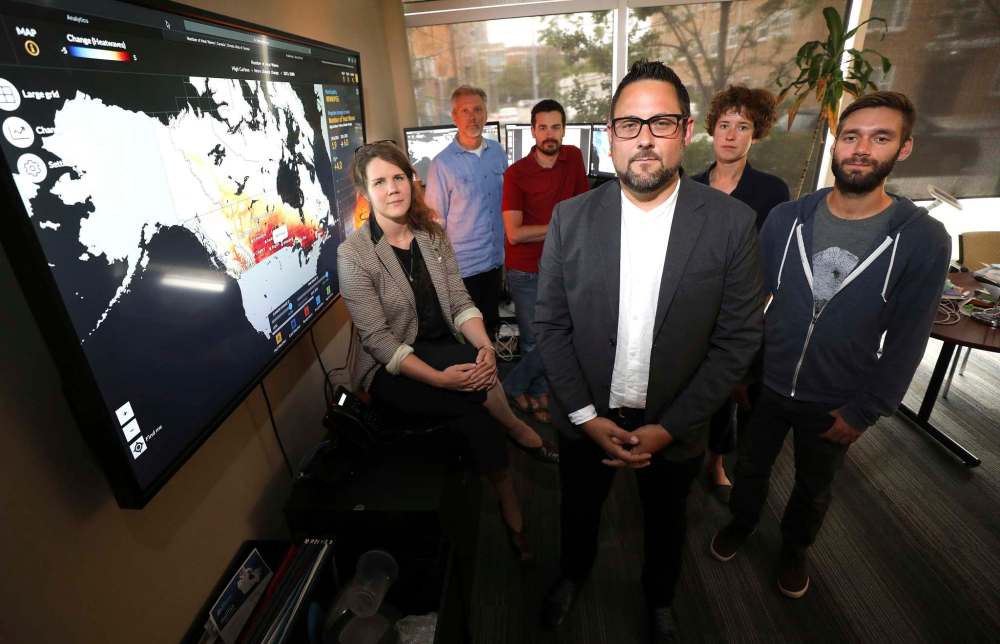Heat waves increasing danger in Canada’s forecast: report
Advertisement
Read this article for free:
or
Already have an account? Log in here »
To continue reading, please subscribe:
Monthly Digital Subscription
$1 per week for 24 weeks*
- Enjoy unlimited reading on winnipegfreepress.com
- Read the E-Edition, our digital replica newspaper
- Access News Break, our award-winning app
- Play interactive puzzles
*Billed as $4.00 plus GST every four weeks. After 24 weeks, price increases to the regular rate of $19.95 plus GST every four weeks. Offer available to new and qualified returning subscribers only. Cancel any time.
Monthly Digital Subscription
$4.99/week*
- Enjoy unlimited reading on winnipegfreepress.com
- Read the E-Edition, our digital replica newspaper
- Access News Break, our award-winning app
- Play interactive puzzles
*Billed as $19.95 plus GST every four weeks. Cancel any time.
To continue reading, please subscribe:
Add Free Press access to your Brandon Sun subscription for only an additional
$1 for the first 4 weeks*
*Your next subscription payment will increase by $1.00 and you will be charged $16.99 plus GST for four weeks. After four weeks, your payment will increase to $23.99 plus GST every four weeks.
Read unlimited articles for free today:
or
Already have an account? Log in here »
Hey there, time traveller!
This article was published 28/08/2019 (2350 days ago), so information in it may no longer be current.
An unsettling report by climate scientists at the University of Winnipeg projects heat waves across the country to become hotter, longer-lasting and more common in the near future due to climate change.
Heat Waves and Health was published today out of the U of W’s Prairie Climate Centre, nearing the end of a scorching 2019 summer during which at least two people died from heat-related causes in southern Manitoba.
The report predicts the climate futures that will play out across Canada and the effect the changes will have on the environment and its residents — posing a severe threat to human health.

It defines a heat wave as three consecutive days when temperatures reach 30 C or higher. By that definition, the average number of heat waves in Winnipeg each year is about two. That total is expected to double by mid-century, and triple during the latter half of the century, if greenhouse gas emissions continue on current trajectories.
“Around the world, we’re seeing heat waves that are having devastating impacts on cities and on communities that are literally leading to the death of citizens,” said Ian Mauro, executive director at the centre. “The heat waves across Europe this year were astounding and they are an example of what’s likely to come around the world, and so the effort here is to think critically about the future in Canada.”
Alongside the report, the Winnipeg-based team of climate scientists and climatologists also launched the Climate Atlas of Canada, a website that allows users to look at specific data about a city. According to the atlas, the average hottest day of a Winnipeg summer could surpass 43 C by 2051.
Mauro said Winnipeg’s future is especially “stark” due to the interior Prairies climate, distant from oceans that can moderate temperatures, putting the environment and economy at risk of droughts and wildfires.
In compiling the report, researchers consulted with health professionals to determine how heat waves affect people with pre-existing health conditions, as well as the average person’s cardiovascular, respiratory and mental health, Mauro said.
People who are socially isolated are also at a higher risk of health problems in the heat because of lower resilience levels, the report says.
“Climate change is going to affect Manitoba. It’s going to affect every community in Manitoba. It will just play out in different ways, depending on where you are and who you are — that’s a really important point,” he said. “We have to start looking at the convergence of extreme heat and social vulnerability.”
A Winnipegger who can afford an air conditioner won’t face the same risks as one who can’t, he said.
The report recommends cities take a multi-faceted approach by setting up cooling stations, creating check-on-your-neighbour programs and planting greenery to provide shade in public spaces.
maggie.macintosh@freepress.mb.ca
Twitter: @macintoshmaggie

Maggie Macintosh
Education reporter
Maggie Macintosh reports on education for the Free Press. Originally from Hamilton, Ont., she first reported for the Free Press in 2017. Read more about Maggie.
Funding for the Free Press education reporter comes from the Government of Canada through the Local Journalism Initiative.
Every piece of reporting Maggie produces is reviewed by an editing team before it is posted online or published in print — part of the Free Press‘s tradition, since 1872, of producing reliable independent journalism. Read more about Free Press’s history and mandate, and learn how our newsroom operates.
Our newsroom depends on a growing audience of readers to power our journalism. If you are not a paid reader, please consider becoming a subscriber.
Our newsroom depends on its audience of readers to power our journalism. Thank you for your support.

